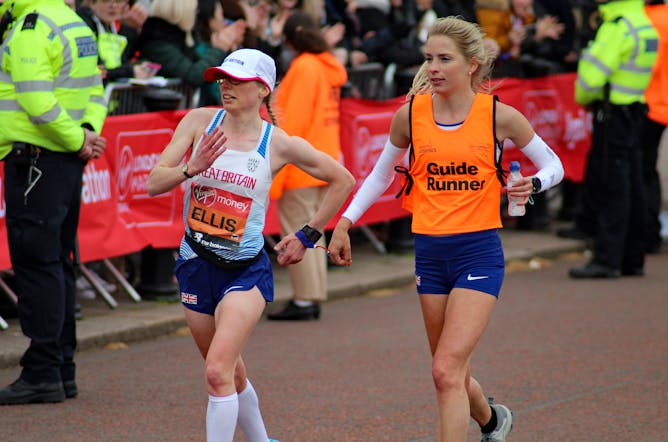|
When I ran my first marathon in 2022, I wasn’t alone. Sure, there were some 40,000 other people on the London Marathon course, but I was also holding one end of a six-inch tether, the other end held by my dear friend Qudsiya, a seasoned marathoner and visually impaired runner. There will be dozens of blind and partially sighted runners taking part in this weekend’s London Marathon, and each will have their own relationship to the sport. In this piece, Jessica
Louise Macbeth and Ben Powis, who have studied the experiences of visually impaired runners explain a variety of techniques they use, as well as the societal barriers that stop many people from getting into the sport.
On the day before the marathon, vinyl obsessives will form long queues from the early hours in order to snap up precious limited editions and other collectors’ items released for the 17th international Record Store Day. Michael Beverland and Giana M. Eckhardt, committed vinylistas and the authors of our latest Insights long read, have spent a decade researching the extraordinary explosion of interest in analogue technology across music, photography and cinema. Their article explains why so many of us prefer these “difficult” technologies both as consumers and creators.
Earlier this week it was revealed that archaeologists excavating Pompeii have uncovered some amazing frescoes, including one depicting Helen of Troy in stunning, colourful detail. Emily Hauser pores over the discoveries and considers the ancient elite’s thirst for stories of the women of ancient Greek myths.
|

|
Avery Anapol
Commissioning Editor, Politics + Society
|
|

GB parasport athlete Charlotte Ellis (left) finishing the 2019 London Marathon with her guide runner.
Dave Smith/Shutterstock
Jessica Louise Macbeth, University of Central Lancashire; Ben Powis, Bournemouth University
Running is empowering for many blind and partially sighted people, but they can face a range of societal barriers to get involved.
|

Analogue music enthusiasts configure a modular synthesizer at the Revision festival in Saarbrücken, Germany, March 2016.
DPA Picture Alliance/Alamy Stock Photo
Michael Beverland, University of Sussex; Giana M. Eckhardt, King's College London
We have spent a decade researching what’s behind the extraordinary revival of vinyl records, film cameras and other ‘old school’ technology
|

The fresco showing Helen of Troy and Paris.
Pompeii Archaeological Park
Emily Hauser, University of Exeter
The paintings show the trio of women from Greek myth in a way that makes us see the Trojan War myth anew.
|
World
|
-
Jonathan Este, The Conversation
A selection of our coverage of the conflict in Gaza from the past fortnight.
-
Kunal Sen, United Nations University
Modi has aimed to improve the lives of ordinary Indians, but some are still finding jobs hard to come by.
-
Intigam Mamedov, Northumbria University, Newcastle
The Taliban is likely to be hoping for economic and political benefits from an improved relationship with Russia.
-
Christoph Bluth, University of Bradford
Iran has reached a stage in its weapons programme where it would be difficult for a single strike to do significant damage.
|
|
Politics + Society
|
-
Sally Pearse, Sheffield Hallam University
I worked with Sure Start and saw the good it brought to communities.
-
Megan Shirley, Nottingham Trent University
The civil procedure rules on settlement are preventing true access to justice.
-
Thomas Scotto, University of Glasgow; Martin Ejnar Hansen, Brunel University London; Steve Pickering, University of Amsterdam
When the public sees an institution is failing, they generally lose trust in it. Not so with the health service.
|
|
Arts + Culture
|
-
Amy Thomas, University of Glasgow
Respondents to a survey confirmed they would hesitate to encourage anyone to become a freelancer given the limited prospects currently offered in the profession.
-
Paul Stephen Adey, Nottingham Trent University
A reconsideration of Nas’s literary clout, 30 years after the release of Illmatic.
|
|
Business + Economy
|
-
Nisreen Ameen, Royal Holloway University of London
Increased confidence from its AI developments, as well as the spending might of the TikTok generation, may have played a role.
|
|
Education
|
-
Alexander Baratta, University of Manchester; Paul Vincent Smith, University of Manchester; Rui He, University of Manchester
International varieties of English aren’t ‘wrong’ just because they differ from native speaker English.
|
|
Environment
|
-
Chris Mackenzie, University of the West of Scotland
Nine artists have taken part in a snorkelling artists’ residency that began underwater in Scotland.
-
Sam Fankhauser, University of Oxford
What happens when statutory carbon reduction targets are missed.
|
|
Health
|
-
Sonja Falck, University of East London
One study found 86% of young people had gone through a friendship breakup.
|
|
Science + Technology
|
-
Dean Lomax, University of Manchester
Ichthyosaurs were the last giant reptiles to rule our oceans.
-
Christian Schroeder, University of Stirling
Perhaps life is more common in the universe that we think.
|
|
|
|
| |
|
|
|
|
| |
| |
| |
| |
| |
|
|